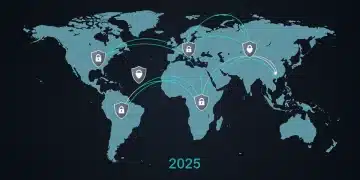2025 National Security Policy: Data Encryption & Digital Rights

Breaking today, the much-anticipated 2025 National Security Policy Review: Key Changes Affecting Data Encryption and Digital Rights has been officially released, signaling a pivotal shift in how governments approach digital privacy and national security. This comprehensive review outlines new directives that will undoubtedly reshape the landscape for individuals, corporations, and international relations.
Understanding the New Policy Framework
The 2025 National Security Policy Review introduces a foundational shift in how national governments intend to manage the delicate balance between safeguarding national interests and protecting individual digital freedoms. This framework, developed over two years, responds to escalating cyber threats and the pervasive use of encrypted communications by various actors.
Officials assert that the new policies are crucial for maintaining stability in an increasingly complex digital world. The core tenets emphasize proactive cyber defense, enhanced intelligence gathering capabilities, and revised legal parameters for accessing encrypted data. These measures are presented as essential to counter terrorism, espionage, and serious organized crime, all of which increasingly rely on secure digital channels.
Shifting Priorities in Cybersecurity
The review highlights a significant re-prioritization in cybersecurity efforts, moving beyond reactive measures to a more preemptive stance. This includes substantial investments in AI-driven threat detection and quantum-resistant cryptographic research.
- Proactive Threat Detection: New systems will leverage artificial intelligence to identify and neutralize cyber threats before they can inflict significant damage.
- Quantum-Resistant Cryptography: Government-funded research aims to develop and implement new encryption standards impervious to future quantum computing attacks.
- International Collaboration: Increased partnerships with allied nations are planned to share intelligence and coordinate responses to global cyber incidents.
These shifts reflect a growing recognition that traditional cybersecurity approaches are no longer sufficient against sophisticated state-sponsored attacks and highly organized criminal networks. The policy aims to build a resilient digital infrastructure capable of withstanding evolving threats.
Mandatory Data Disclosure Provisions
One of the most contentious aspects of the 2025 National Security Policy Review is the introduction of mandatory data disclosure provisions. These new regulations compel technology companies to provide access to encrypted data under specific legal conditions, a move that has already drawn sharp criticism from privacy advocates and tech industry leaders.
The policy outlines a tiered system for data access, differentiating between routine requests, emergency warrants, and situations deemed critical to national security. Companies failing to comply face substantial penalties, including hefty fines and potential operational restrictions within the country. This provision aims to close what authorities describe as ‘dark spaces’ in digital communication, where illicit activities can flourish undetected.
Legal Challenges and Industry Pushback
The tech industry has voiced strong opposition, arguing that mandated backdoors or decryption keys compromise the fundamental security of their products and services. Legal experts are also preparing challenges, citing concerns over constitutional rights and the potential for abuse.
- Erosion of Trust: Critics argue that mandatory access provisions will undermine user trust in digital platforms, potentially pushing users towards less secure or offshore services.
- Technical Feasibility: Many tech companies contend that creating ‘backdoors’ for law enforcement inherently weakens encryption for everyone, making systems more vulnerable to malicious actors.
- Global Implications: The policy could set a precedent that encourages other nations to adopt similar measures, leading to a fragmented and less secure global internet.
As of today, several prominent technology firms have issued public statements expressing their dismay and indicating their intent to engage in legal and legislative battles against these provisions. The Electronic Frontier Foundation (EFF) has called the policy a direct assault on digital rights.
Impact on Digital Rights and Privacy
The 2025 National Security Policy Review directly impacts fundamental digital rights and privacy expectations for citizens. The expanded surveillance capabilities and data access mandates raise significant questions about the extent of government oversight into private communications and personal data.
Under the new policy, the threshold for government access to personal data has been lowered in certain national security contexts. This means that individuals’ encrypted messages and data, previously considered impervious, could now be within reach of state agencies under specific legal frameworks. The government maintains that these measures are narrowly tailored and subject to judicial review, though privacy advocates remain skeptical.
The policy details mechanisms for oversight and accountability, including a new independent review board tasked with monitoring government data access requests. However, the effectiveness of such oversight bodies remains a key point of debate among civil liberties groups. They argue that the sheer volume of potential data access requests could overwhelm any oversight mechanism, leading to rubber-stamping of warrants.
Furthermore, the policy introduces new penalties for individuals or organizations found to be actively assisting in the circumvention of these new data access mandates. This could include developers of privacy-enhancing technologies or secure communication platforms, potentially stifling innovation in areas critical for digital freedom. The scope and interpretation of ‘assistance’ are expected to be major legal battlegrounds in the coming months.

International Ramifications and Cyber Diplomacy
The 2025 National Security Policy Review is poised to have significant international ramifications, influencing cyber diplomacy and setting precedents for how other nations might approach similar security challenges. The policy’s emphasis on data access and encryption has already sparked discussions among international allies and adversaries alike.
Allied nations are closely observing how these new policies are implemented and debated, potentially influencing their own national security strategies. There is a clear tension between the desire for enhanced security cooperation and the differing legal and ethical frameworks regarding digital privacy across various jurisdictions. This could lead to complex negotiations on data sharing agreements and mutual legal assistance treaties.
Global Standards and Digital Sovereignty
The policy’s unilateral nature, despite calls for international collaboration, raises questions about the future of global digital standards and the concept of digital sovereignty. Some countries may view these changes as an assertion of national digital control, prompting them to develop their own restrictive policies.
- Fragmented Internet: The imposition of national data access rules could contribute to a more fragmented internet, where data flows are increasingly restricted by national borders and varying legal requirements.
- Trade Implications: Technology companies operating internationally could face a patchwork of conflicting regulations, complicating global operations and potentially impacting trade relations.
- Diplomatic Tensions: Disagreements over data access and encryption policies could strain diplomatic relations, particularly with nations that prioritize individual privacy more heavily.
Experts in international law and cybersecurity are warning that this policy could either catalyze a new era of coordinated global cyber defense or exacerbate existing divisions, leading to a less secure and more politicized internet landscape. The coming months will be critical in observing international responses and adaptations.
Economic and Technological Implications
Beyond the legal and privacy concerns, the 2025 National Security Policy Review carries substantial economic and technological implications. The mandates concerning data encryption and access will necessitate significant re-engineering for tech companies, potentially impacting innovation and market competitiveness.
For startups and smaller tech firms, the compliance burden could be particularly onerous, potentially stifling new entrants into the market. Larger corporations, while possessing more resources, will still face considerable costs associated with updating infrastructure, developing new compliance protocols, and navigating complex legal challenges. This could divert resources from research and development into compliance, slowing down technological advancement in critical sectors.
The policy also poses a challenge to the reputation of tech companies as custodians of user privacy. If users perceive that their data is less secure or more accessible to governments, it could lead to a decline in trust and adoption of certain technologies. This, in turn, could impact the global competitiveness of the nation’s tech sector, as users and businesses may opt for services provided by companies in jurisdictions with stronger privacy protections.
Moreover, the focus on quantum-resistant cryptography, while forward-looking, demands substantial investment and expertise. This could create a technological divide, where only well-funded entities can afford to implement such advanced security measures, leaving smaller organizations vulnerable. The government has indicated plans for public-private partnerships to address this, but the scale of the challenge remains immense.
Public Discourse and Future Policy Adjustments
The release of the 2025 National Security Policy Review has ignited a fervent public discourse, with debates unfolding across media, academic institutions, and online forums. Citizens, civil liberties advocates, and industry stakeholders are actively engaging in discussions about the balance between national security and individual freedoms.
Public opinion is sharply divided, reflecting the complex nature of the issues at hand. While many acknowledge the legitimate need for enhanced national security in an era of escalating cyber threats, a significant portion of the populace expresses deep concerns about potential government overreach and the erosion of privacy rights. Petitions are circulating, and protests are being organized, indicating a strong public desire for further dialogue and potential amendments to the policy.
Government officials have stated that the policy is a living document and open to adjustments based on feedback and evolving circumstances. However, the extent to which these adjustments will address the core concerns of privacy advocates remains uncertain. The coming months are expected to feature intense lobbying efforts from various groups, aiming to influence the implementation details and any subsequent revisions.
Educational campaigns are also underway, both from government agencies explaining the rationale behind the policy and from advocacy groups raising awareness about its potential implications. This ongoing dialogue is crucial for shaping the future trajectory of digital rights and national security in the nation, ensuring that policy decisions reflect a broad spectrum of societal values and technological realities.
| Key Policy Area | Brief Description of Change |
|---|---|
| Data Encryption Access | Mandatory provisions compel tech companies to provide access to encrypted data under specific legal conditions. |
| Digital Rights Impact | Expanded surveillance capabilities and lower thresholds for government access to personal data in national security contexts. |
| Cybersecurity Strategy | Shift to proactive cyber defense, AI-driven threat detection, and investment in quantum-resistant cryptography. |
| International Relations | Potential for strained diplomatic relations and a more fragmented global internet due to differing data access policies. |
Frequently Asked Questions About the 2025 National Security Policy
The policy aims to enhance national security by improving cyber defense, enabling intelligence gathering, and establishing legal parameters for accessing encrypted data. It seeks to counter evolving cyber threats, terrorism, and organized crime in the digital realm.
The policy introduces mandatory data disclosure provisions, compelling technology companies to provide access to encrypted data under specific legal conditions, which could include emergency warrants or national security directives.
Privacy advocates fear an erosion of digital rights, potential government overreach, and the creation of ‘backdoors’ that could weaken overall cybersecurity. They argue that these measures could undermine user trust and lead to abuses of power.
Yes, technology companies could face significant compliance burdens and conflicting regulations across different jurisdictions. This might impact their global operations, innovation, and competitiveness due to varying digital privacy standards worldwide.
Officials have indicated that the policy is a ‘living document’ and is open to adjustments based on public feedback and evolving circumstances. An independent review board is also established to monitor data access requests, though its effectiveness is debated.
Looking Ahead
The release of the 2025 National Security Policy Review: Key Changes Affecting Data Encryption and Digital Rights marks a critical juncture for digital freedom and national security. The coming months will be defined by intense legal battles, technological adaptations, and ongoing public debate. Stakeholders across government, industry, and civil society will continue to navigate these complex issues, shaping the practical implementation and long-term implications of these far-reaching directives. The world watches as this nation attempts to balance security imperatives with fundamental digital rights in an ever-evolving technological landscape.





